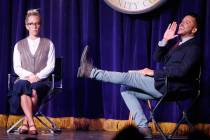Rough childhood challenged Fator
Terry Fator's book sat on the desk, unread, for weeks.
"Who's the Dummy Now?" looked like something cranked out quickly to sell alongside the plush toys in the gift shop. Probably just a quickie rehash of the popular ventriloquist's Cinderella story, and how he broke out to win "America's Got Talent" and become the new Mirage headliner.
And for the first 30 pages, it is. Then he starts talking about his father and it gets dark.
Really dark.
"Some of us have parents who descend into darkness and madness ... but when it happens to you the changes happen so subtly and slowly that it is hard to determine when they actually occurred," Fator writes.
From then on, much of the book deals with the mental and physical abuse Fator and his two siblings suffered from their father, who disguised his own instability with religious fundamentalism and by moving the family around Texas more often than military brats.
Since his father had once thrown out all his magic kits, Fator protected his developing skills as a ventriloquist by claiming he wanted to use the art in ministry. Even then, it's good the young Fator never trusted early reviews from a father always quick to tell him he didn't have any talent.
He and his sister never considered their spankings abuse until later in life, even though "he would spank us so hard and with such force that our butts and thighs would turn every shade of color," he writes. "Only once did he hit me across the face." That's when he was 8. One day, years later, his father waved a gun at them, and Fator thinks he avoided disaster by fleeing with the gun.
Fator eventually made an emotional break and hasn't spoken to his father in years. "He doesn't think there's anything wrong with him. It's everybody else," he says. When the ventriloquist performed in upstate New York where his father lives now, security kept a watchful eye out. "They had read my book."
He hopes others do, too. The message is to "take the bull by the horns and take control of your own life, and not blame other people in your past for your failure," he says.
Putting it all on the page was therapeutic, he says. "Getting on the phone with my sister and brother and discussing it was very liberating for all of us."
"It's amazing that not one of us three kids turned into alcoholics or drug addicts," he adds. They had each other, he says, but of course Fator had his puppets, too. He seems to have held his life together by the unwavering knowledge that a ventriloquist was the only thing he was ever meant to be.
Thanks to the movies, we tend to think of ventriloquists as being a bit kooky, even psychotic. But with Fator, the puppets helped keep him sane.
Contact reporter Mike Weatherford at mweatherford@reviewjournal.com or 702-383-0288.

















